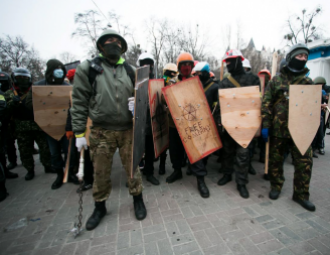Oleh Levchenko: “Right sector” will leave the scene immediately after the presidential election

The coordinator of the civic network OPORA, Maidan’s civic activist talks about the unexpected results of the presidential election and about whether we should be afraid of Ukraine’s nationalism.
At the international conference in Vilnius organized by “EuroBelarus” Consortium, Oleh Levchenko talked about the unpredictable results of the presidential election in Ukraine, which is to take place on May 25 this year.
In the interview with the EuroBelarus Information Service Oleh Levchenko explained:
- The thing is that usual political actors which are traditionally taking part in the campaigns – communists, representatives of the Party of Regions – step away from the electioneering now. Even if they participate in the election, their attempts won’t be successful. Secondly, the behavior of the opposition (which now has turned into authorities) was confusing. We heard the statements made by the three leaders and we heard Julia Tymoshenko’s speech, and we see that people had mixed feelings about them. There are some more potential candidates, who are not very familiar to everybody now; but I think it is among these unpopular personas that the competition will take place. It is among them that people will choose new Ukraine’s personalities, who are capable of solving the problems that Ukraine is facing. I believe this election will have lots of surprises.
- Both Russian propaganda and Belarusan mass media threaten people with Ukrainian radical nationalists and their alleged successor “The right sector”. How influential is this organization in reality?
- The situation with the “Right sector” is controversial, as nobody really knows what “Right sector” is. First of all, it is a spontaneously emerged union consisting of really nationalistic or pro-nationalistic organizations “Tryzub” UNA-UNSO and others. But we should also understand that the “Right sector” unites small number of people, while the frame work at Maidan was mostly formed people from self-defense who had already participated in hostilities before. Among the hundreds of people the representatives of the “Right sector” were estimated only in dozens. For today the situation differs a lot from region to region. There are regions where “Right sector” is absolutely adequate and responsible; however, in many regions it is a complete analogy of Makhnovist successors. Though, I think that this policy of Makhno will soon be over. The authorities just have to give really quick responses, as the unrepresentative Maidan issuing a lot of statements, making dismissals or some weird assignments and demanding immediate disclosure of personal files. And the “Right sector” is actively participating in all this and pursues rather controversial policy. I think that after the ban on weaponry and after the presidential election the “Right sector” will disappear; we shouldn’t be afraid of it.
If we talk about the rise of nationalism, I think that the situation in Ukraine can rather be described as the growth of patriotism nobody in Europe should be afraid of. Fortunately, all European countries have in this way or another helped Maidan, and we are grateful to everyone who supported the Ukrainian people.
- What about Crimea? Will it flourish in the new empire or become degraded?
- For now political scientists and economists haven’t estimated the fate of Crimea. But in reality Crimea wasn’t some subsidized depressive and poor Ukraine’s region as many people think. According to statistics, the income level of Crimea was at the forth place among Ukraine’s regions. Of course, there are certain problems with electricity, water, lack of industry; but there is Chornomornaftogaz (which is occupied now), there are other spheres which give Crimea a chance for economic growth. But there is a feeling that Crimea will rather be a military base than the recreation area. It is hard to make prediction as to what will happen during the tourist season, but Russia is most likely to re-direct tourist flows to Sochi, which Russian media persistently write about. Crimea is facing very serious economic challenges – Russian economy is dropping and it is unknown whether it will manage to help and get profit from Crimea. It is still an open question whether those 600 thousand Ukrainians, 280 thousand Tartars and other nations will be eager to become Russian citizens.
Thus, nothing is certain. The key task for Putin now is to make life in Crimea better than it had used to be. If it doesn’t manage to do that he will get a big tide of discontent. So it is too early to talk about the loss of the Ukrainian peninsula. However, Sevastopol is a different question, as for the last 7-8 years Ukraine has been neglecting it. We should also always remember about the threat to the East and South Ukraine.
-
03.01
-
07.10
-
22.09
-
17.08
-
12.08
-
30.09










































